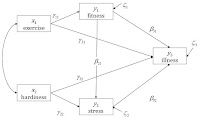Biosciences Seminar Series - Autumn 2016
01 December 2016 - 1pm - Zoology Museum (Wallace 129)
The devil is in the details: on a quest for causality in ecology and evolution
Dr Achaz von Hardenberg
Our speaker of this week, Dr Achaz von Hardenberg from the Department of Biological Sciences at the University of Chester (UK) will present his research on the links between parasites, behaviour life history variation and genetics in mountain mammals, using causal inference methods for ecological research. Achaz is a conservation ecologist, interested in behavioural ecology, population dynamics and conservation, especially of mountain ungulates and marmots. Previous to Chester, Achaz worked at the National Centre for Statistical Ecology (University of Kent, UK) and before going back to Academia, Achaz was as a research biologist and head of the science section at the Gran Paradiso National Park (GPNP, Northwestern Italian Alps), responsible for the long term ecological research and conservation projects in the Park.
Disentangling cause-effect relationships is a primary, understated, goal in evolutionary biology and ecology. Controlled and randomised experiments, the golden standard in causal inference, can be used to study ecological and microevolutionary processes in the lab but are rarely applicable in ecological studies on wild populations, or when the interest lies in explaining the macroevolutionary processes behind the variability in traits among species. With few exceptions field ecologist and comparative evolutionary biologists thus renounce to make any inference about causality from their observational studies, resigning to the sobering precept - we all learnt during our undergraduate statistics courses - that correlation does not imply causation.
 However, recently new structural equation modelling (SEM) approaches have been developed, providing formal methods to specify and compare complex models of the relationships among ecological variables, in order to disentangle direct and indirect causal effects when only observational data is available. In this talk I will provide a short introduction to causal inference and show how we have applied these powerful methods to test causal models of the complex relationships between corticosteroid hormones, parasites, behaviour, genetic variability and life history traits in various wildlife species including Bighorn sheep (Ovis canadensis), Chamois (Rupicapra rupicapra), Alpine ibex (Capra ibex) and Alpine marmots (Marmota marmota).
However, recently new structural equation modelling (SEM) approaches have been developed, providing formal methods to specify and compare complex models of the relationships among ecological variables, in order to disentangle direct and indirect causal effects when only observational data is available. In this talk I will provide a short introduction to causal inference and show how we have applied these powerful methods to test causal models of the complex relationships between corticosteroid hormones, parasites, behaviour, genetic variability and life history traits in various wildlife species including Bighorn sheep (Ovis canadensis), Chamois (Rupicapra rupicapra), Alpine ibex (Capra ibex) and Alpine marmots (Marmota marmota).
Recently we have also extended causal inference to phylogenetic comparative studies, developing a method for Phylogenetic Path Analysis which finally allows
evolutionary biologists to formulate causal models of hypothesised direct and indirect evolutionary relationships between life history, ecological and morphological traits in comparative studies taking into account the underlying phylogenetic signal. Finally I will discuss the potential of causal inference to provide better evidence to inform conservation.


No comments:
Post a Comment